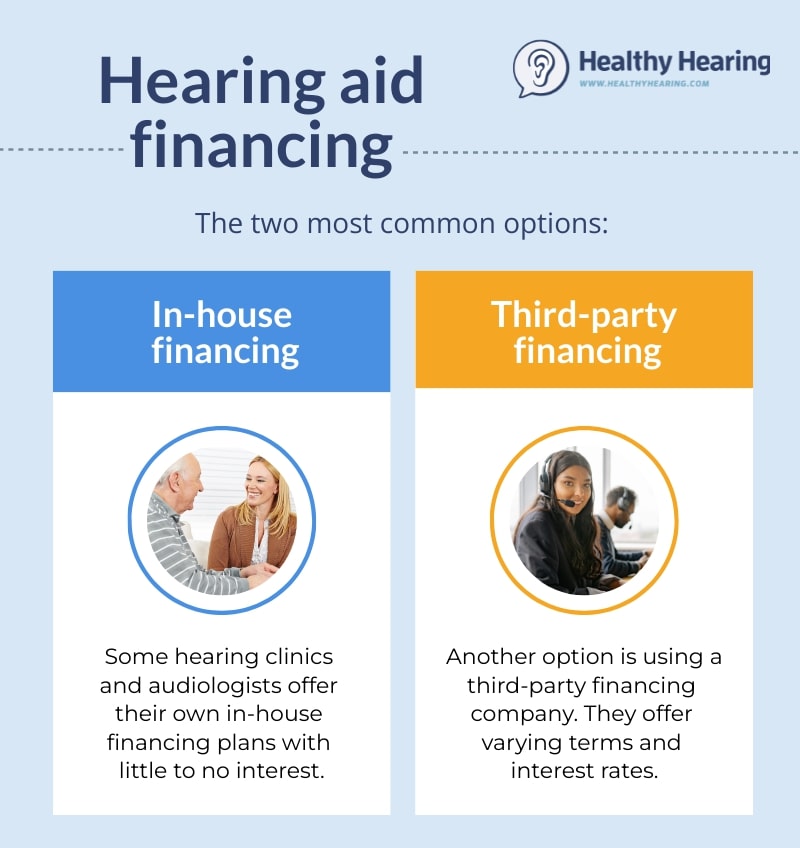|
www.HealthyHearing.com |
Insurance and financial assistance for hearing aids
By Corey Whelan  Reviewed by
Mandy Mroz, AuD, Former President, Healthy Hearing Reviewed by
Mandy Mroz, AuD, Former President, Healthy Hearing Last updated on: November 19th, 2025 An in-depth look at the insurance coverage and financing options for hearing aids. Table of contentsHearing aids are the first line of defense for correcting hearing loss, but they can be expensive. The average cost of prescription hearing aids can range from $2,000-$7,000 per device. 
aids are covered by insurance. The good news is that there are multiple options to help offset these costs. Are hearing aids covered by insurance?It depends. Many insurance plans, including some private insurers and Medicare Advantage plans, may cover part of the cost for hearing care, including prescription hearing aids. However, it's important to know that coverage varies widely depending on your plan, your age, and your location, among other factors. Let's take a look at what the options are and how you can determine if your hearing aids are covered by insurance. Does Medicare cover hearing aids for seniors?Hearing loss becomes more common as people age, so it might seem like a no-brainer that Medicare would cover the cost of hearing aids. Unfortunately, that’s not the case. When it comes to hearing care, Original Medicare (Parts A and B) doesn't offer much coverage for older adults, including not covering hearing tests or hearing aids. However, Medicare Advantage (Part C) does supply some coverage. Additionally, if you have supplemental insurance, it may pay for some or all of these services, depending on your plan. Read more: Medicare and hearing aids. What about Medicaid?In every U.S. state, children's hearing aids are covered by Medicaid. For adults, Medicaid coverage varies by state and eligibility is subject to change. This page from the Hearing Loss Association of America lets you look up Medicaid coverage for hearing care by state. You can also contact your state’s Medicaid program or visit Medicaid's national website for more information. Does my employer's health insurance cover hearing aids?Potentially. If you have health insurance through your employer, hearing aid coverage can vary depending on the insurer and the specific plan tier you’ve chosen. Many companies offer multiple tiers of coverage, each with different benefits and out-of-pocket costs, explains Blaire Driscoll, a practice administrator for Gardner Audiology in Tampa, FL. If you’re a government employee or work for a large corporation, you may already be in luck. “These types of workplaces typically have hearing aid benefits that are very good. Of course, deductibles and coinsurance out-of-pocket costs will also apply,” she adds. If you're not sure, reach out to your human resources department to find out what, if any, hearing coverage you have. You also may want to contact your benefits company for help clarifying what you are and aren’t covered for.
What if my company doesn't offer coverage?If you work for a company that doesn’t offer any hearing aid coverage, speaking up may help you to obtain that benefit. “Hearing aids can help you be more efficient at work. Talk to HR or your payroll department about your need for this service. In some cases, they may carve out a benefit for you,” Driscoll recommends. Is there insurance just for hearing aids?Unlike vision or dental, there aren’t really separate plans just for hearing health or hearing aids. Any covered audiological services are typically included within your general health plan, not offered as standalone insurance. How your hearing aid benefits typically work
have substantial benefits, such as reducing social isolation. Even if you have it, insurance coverage for hearing aids varies in the way it is administered. Here are some real-life benefit types for hearing aids:
How to ask your benefits provider about hearing aid coverageAsk these questions when you call your insurance company about hearing aids:
Which hearing providers accept my insurance?As with any healthcare condition, you may have to do some digging before you find an audiologist, hearing instrument specialist (HIS) or an ear, nose and throat (ENT) doctor who accepts your insurance plan. Driscoll recommends asking what insurance plans your hearing care provider takes before making an appointment. She also suggests empowering yourself by asking your insurance company which providers are in their network. “Audiologists and ENTs usually accept some insurance plans. Companies that sell hearing aids online don’t always take insurance,” she explains. Driscoll also notes that United Healthcare and Blue Cross Blue Shield are examples of insurance companies that work with third-party administrators (TPAs) to offer hearing aids to their beneficiaries. Large TPAs include: Union or retirement plan hearing coverageUnion members and their dependents usually have access to hearing care coverage. “All union plans have some sort of hearing aid coverage, and it’s usually very good,” says Driscoll. Often these plans contain the following:
Hearing aid coverage for active military and veteransActive military personnel and their families have hearing aid coverage through TRICARE, provided that their hearing loss meets specific hearing criteria. You’ll need to be diagnosed with hearing loss through a TRICARE-approved audiologist or physician. The VA is the largest provider of hearing aids in the United States. If you are a veteran or have a service connection, check with your local VA to see whether you qualify for benefits and hearing-related services, including the provision of hearing aids. Does my state mandate hearing aid coverage?Currently, about 35 states mandate health insurance companies provide full or partial hearing aid coverage for children. However, that coverage can vary a lot. For example, in Missouri only coverage for newborns is required. Alternatively, Massachusettes and North Carolina extend coverage up to age 21 and 22, respectively. What about adults?Only five states (Arkansas, Connecticut, Illinois, New Hampshire, Rhode Island) specifically extend those mandates to adults. Additionally, New York, South Carolina, and California have active bills this session aiming to expand hearing aid coverage, including requirements for insurance to cover hearing aids and related services for children and adults. If your state does mandate coverage, you will need to do a little research to find out about the amount covered and how often a claim can be made, as well as any other qualifiers for the coverage. Your hearing care professional can often provide some guidance as you search. Additional FAQsHow do I finance my hearing aids?Financing your hearing aids allows you to make a series of smaller payments spread out over time. Many hearing clinics offer financing, either in-house, or via a third-party program like CareCredit.
Can you get workers' compensation for hearing loss?Yes. If your hearing is damaged on the job, you may be entitled to workers' compensation to help cover the cost of hearing aids and other treatments. Are there social security benefits for hearing loss?Yes. If your hearing loss is affecting your ability to work, you may be eligible for assistance through the Social Security trust fund. Are hearing aids tax deductible?Hearing aids are tax deductible, as are most medical expenses. Your employer also may offer a health savings account (HSA), which lets you withdraw pre-tax dollars to pay for hearing aids. You can also use an HSA for hearing aid batteries, repairs and maintenance. Are there discount programs for hearing aids?Yes. You may qualify for discounts on your hearing aid purchase through your association with various memberships, such as AARP, AAA, your health plan, your vision plan or your union affiliation. Explore your options to find the best value. Do charitable programs for hearing aids exist?Yes. There are many charitable groups that will provide new or used hearing aids at a discount, or even free, if you meet the financial criteria. We've listed a few national programs below, but this is not an exhaustive list of organizations. We also recommend reviewing the financial assistance page from HLAA, the Hearing Loss Association of America and checking to see if there are any local hearing aid banks in your community.
What about state vocational rehabilitation programs?If hearing aids are required for employment, your state vocational rehabilitation office may offer assistance to pay for hearing aids or educational opportunities to improve your skill set. Search online for “[your state] vocational rehabilitation program” to find what you need. Are OTC hearing aids more affordable?Over-the-counter (OTC) hearing aids are more affordable than prescription hearing aids, and can be a helpful tool for some. However, they aren't for everyone. They are only FDA approved for adults with mild to moderate hearing loss. Curious to learn if they are right for you? Check out our comprehensive OTC hearing aid guide. Find a hearing care provider near youThe information you find online about hearing aid insurance and funding can help guide you in the right direction. But for personalized guidance tailored to your individual needs, your best resource is a local hearing care professional. They can help you explore all available options that work within your budget and connect you with funding sources that are right for you. Reach out to a hearing health provider in your area today to get started. Corey WhelanCorey Whelan is a freelance health writer and patient advocate based in New York. She specializes in medical content about reproductive health, cancer, hearing health, and menopause. Whelan lives with two fascinating people who happen to be her children and two extremely silly rescue dogs.
You are reading about: Related topics
More information about hearing loss, hearing aid brands, assistive devices and tinnitus. Featured clinics near me
Earzlink Hearing Care - Reynoldsburg Find a clinicWe have more hearing clinic reviews than any other site! Related contentThe Healthy Hearing Report |
|
www.HealthyHearing.com |
Insurance and financial assistance for hearing aids
By Corey Whelan  Reviewed by
Mandy Mroz, AuD, Former President, Healthy Hearing Reviewed by
Mandy Mroz, AuD, Former President, Healthy Hearing Last updated on: November 19th, 2025 An in-depth look at the insurance coverage and financing options for hearing aids. |



